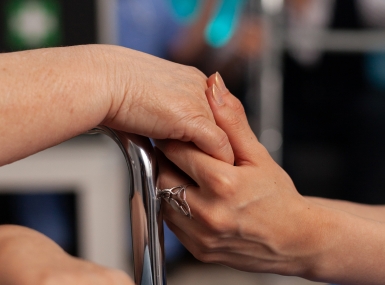FCC takes critical steps to improve the 988 National Suicide Lifeline
Author

Blaire Bryant

Naomi Freel
Upcoming Events
Related News

Key Takeaways
On March 21, bipartisan congressional leaders and Federal Communications Commission (FCC) Chairwoman Jessica Rosenworcel announced steps to improve the 988 National Suicide Lifeline. The FCC will issue a Notice of Proposed Rulemaking (NPRM) on georouting for 988, making the 988 Lifeline more accessible to residents and improve connections to local mental health services. This announcement marks major progress on the nation’s crisis response, a priority for counties and a key policy pillar of the NACo Commission on Mental Health and Wellbeing.
What was announced?
The FCC will propose a rule to improve 988 by routing calls based on callers' general physical location rather than their phone number's area code. It is important to note that as part of this proposed solution, the exact location of callers will not be provided to the 988 Lifeline to protect individuals’ privacy. The issue of 988 georouting has been a priority for the Bipartisan Senate Mental Health Caucus, co-founded by Sens. Alex Padilla (D-Calif.) and Thom Tillis (R-N.C.). Last year, following NACo’s advocacy on Capitol Hill and meetings with the FCC, Sens. Padilla and Tillis introduced the Local 988 Response Act of 2023 (S.4333), with a companion bill introduced by Rep. Tony Cárdenas, co-chair of the House 988 & Crisis Services Task Force.
Why is it needed?
Since launching in 2022, there have been over seven million calls to 988, making it an essential tool for counties in supporting the mental health of residents. Georouting refers to technical solutions that enable calls to be directed based on the location of the caller without transmitting the caller’s precise location information. These solutions would permit wireless calls to the 988 Lifeline to be directed to nearby crisis centers based on factors such as the cell tower that originated the call rather than the area code of the wireless device used to place the call. This system would maintain any privacy requirements carriers may have about the nature of such sensitive calls. Routing calls based on the caller's geographical proximity rather than using the caller’s area code, ensures a quicker response from mental health professionals.
What is the impact on counties?
Counties are responsible for providing a robust behavioral health care continuum. By connecting callers directly to the nearest call center, counties can prioritize prompt and secure care while protecting user privacy. In June 2023, NACo met with the FCC to emphasize that georouting calls to 988, meaning directing calls based on a caller’s location rather than their phone’s area code, would enable counties better to support the needs of those callers.
What are the next steps?
The NPRM was circulated to the full Federal Communications Commission following yesterday’s announcement. If adopted by the full Commission, the NPRM will open for public comment before a final rule will be released. NACo will solicit thoughts from members on local needs for implementation of the final rule, and will continue to provide updates on this rule as it progresses through the rulemaking process.
Related News

National Association of Counties Launches Initiative to Strengthen County Human Services Systems
The National Association of Counties (NACo) announces the launch of the Transforming Human Services Initiative, a new effort to help counties modernize benefits administration, integrate service delivery systems and strengthen county capacity to fulfill our responsibility as America’s safety net for children and families.

HHS Secretary Kennedy touts fixes for obesity, chronic illness, mental health issues
Counties can help improve health outcomes by prioritizing prevention over treatment, Robert F. Kennedy Jr., secretary of the U.S. Department of Health and Human Services told NACo Legislative Conference attendees.

Information-sharing bill could protect court workers
The Countering Threats and Attacks on Our Judges Act could provide more than 30,000 state and local judges with access to security assessments, best practices and a database of threats made against colleagues in the justice field.


